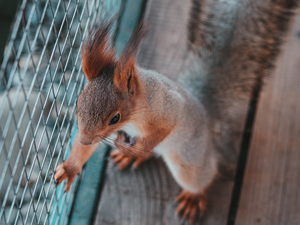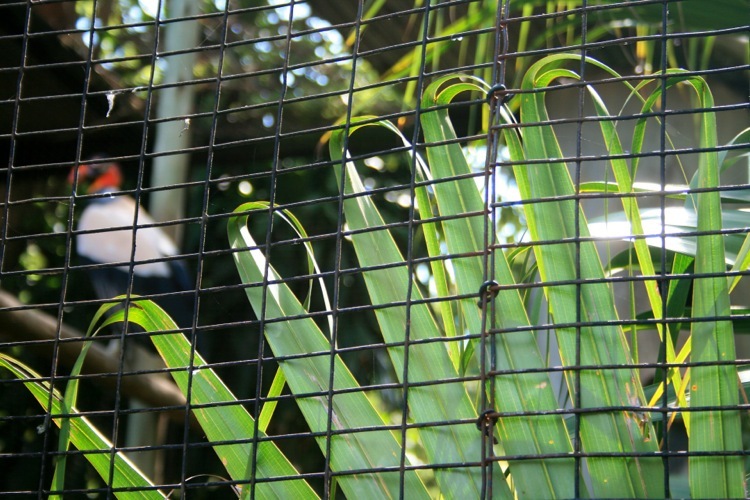Theres no denying how cute squirrels are, but they can also be quite a nuisance for homeowners. Without proper barriers in place, the bushy-tailed creatures can get into your garden or home and wreak havoc.
— Attics — Chimneys — Holes for electrical wires — Utility pipes that are sticking out — Foundation vents — Rotten boards — Soffits — Windows
Preventative maintenance is crucial because once squirrels get in, it can be hard to get them out. Not only that, but they can cause substantial damage trying to escape an enclosed space.
In many cases, wire mesh is an excellent solution. A lot of people who own their own homes might be wondering, “Can squirrels chew through wire mesh? If so, what kinds?”
Chicken wire (also known as hex mesh) has many uses, particularly in the gardening and home improvement domains. However, its not recommended for squirrel exclusion, as most rodents can chew through it. Keep reading for a breakdown on the best type of mesh for keeping squirrels out.
Squirrels may seem cute and harmless, but they can cause extensive damage when they invade your home or garden. From chewing through wiring to decimating your vegetable crops, squirrels are clever critters that find their way into all kinds of places they shouldn’t be. The good news is that wire mesh is an effective deterrent for keeping squirrels out of areas you want to protect. But with so many types of wire mesh on the market, how do you choose the best option for squirrel control?
In this article, we’ll go over the benefits of using wire mesh for squirrel exclusion, the most important factors to consider when selecting wire mesh, and provide recommendations on the optimal wire mesh to choose for your specific needs
Why Use Wire Mesh for Squirrel Control?
Wire mesh is one of the most versatile and durable solutions for keeping squirrels out of homes, gardens, and other areas. Here are some of the key advantages of wire mesh:
-
Physical barrier Wire mesh presents a physical obstruction that makes it challenging for squirrels to enter Properly installed mesh over openings leaves no gaps for squirrels to squeeze through,
-
Customizable coverage Wire mesh comes in different opening sizes and can be cut to any shape and size to cover vulnerable access points, This allows you to completely seal off entryways
-
Long lasting: Quality wire mesh is resistant to rust, corrosion, and the elements. Once installed, it provides lasting protection without the need for frequent replacement.
-
Low maintenance: Wire mesh is a set-it-and-forget it solution. As long as it’s initially installed correctly, wire mesh requires little ongoing maintenance compared to other deterrents.
-
Versatile uses: In addition to excluding squirrels, wire mesh has lots of handy uses around the home and yard – from securing air conditioners to protecting gardens.
Key Factors When Selecting Wire Mesh
With wire mesh being such an effective squirrel barrier, your main challenge is choosing the right type of mesh for your particular needs. Here are the most important factors to consider:
Mesh Opening Size
The size of the openings in the mesh is critical. The openings need to be small enough that squirrels can’t squeeze through or claw their way in. The best mesh opening size for keeping out squirrels is 1/4-inch or smaller. This allows air circulation while preventing access.
Wire Gauge
The wire gauge indicates the thickness of the wire used in the mesh. Thicker wire is stronger and more durable. For squirrel exclusion, look for wire gauges of 23 gauge or higher. Common gauges used are 23, 24, and 28 gauge.
Material Type
Squirrel-control mesh is available in different materials like stainless steel, galvanized steel, and aluminum. Stainless steel offers the greatest durability and resistance to rust. But galvanized steel is also a good, more affordable choice. Avoid aluminum as it’s less sturdy.
Weave Style
The way the wires are woven together impacts the strength and spacing of the openings. Welded mesh has wires fused at the intersection points creating a rigid, flat barrier. Woven mesh is more pliable but openings can be stretched. Welded styles are best for excluding squirrels.
Recommended Wire Mesh Options
With the key selection criteria covered, here are some of the top wire mesh products recommended for keeping squirrels at bay:
1. 1/4″ Opening 23 Gauge Galvanized Welded Wire Mesh
- 1/4″ openings ideal for blocking squirrels
- Durable 23 gauge galvanized steel wire
- Rigid welded weave
- Most affordable squirrel mesh option
This heavy-duty galvanized steel mesh with small 1/4″ openings is one of the most popular and economical choices for squirrel exclusion. The galvanization provides corrosion resistance and 23 gauge wire strikes the optimal balance of strength and malleability for shaping the mesh as needed.
2. 1/4″ Opening 28 Gauge Stainless Steel Welded Wire Mesh
- Corrosion-resistant stainless steel construction
- Small 1/4″ openings prevent entry
- Durable 28 gauge wire
- Welded weave keeps rigid structure
For high longevity in outdoor installations, stainless steel is the premier material. The smaller 28 gauge wire enables this stainless steel mesh to be tightly woven with 1/4″ openings that no squirrel can squeeze through. It’s weather and rust-proof.
3. 1/4″ Opening 23 Gauge Galvanized Steel Woven Wire Mesh Rolls
- Easy to work with rolls for covering large areas
- Durable 23 gauge galvanized wire
- Handy 1/4″ openings in woven weave
- More economical than welded mesh
When you need to cover a large surface, this galvanized woven wire mesh in roll format makes the job easier. The woven weave is flexible for shaping while the 23 gauge wire provides sturdiness. Roll fencing out over your entire garden or fruit trees.
Protecting Your Home and Garden from Squirrels
Installing squirrel-control wire mesh properly is key to preventing those persistent squirrels from finding another way inside where you don’t want them. Here are some tips:
-
Use wire mesh to seal off any openings wider than 1/4-inch around your home’s roofline, eaves, attic vents, chimneys, and crawl spaces. These are typical squirrel entry points.
-
For gardens and fruit trees, install 1/4″ mesh fencing at least 3 feet high around the perimeter with a portion buried underground to block burrowing.
-
Ensure the mesh is pulled taut with no visible gaps and use durable zip ties to firmly secure in place.
-
Check mesh regularly for any loose edges, holes, or separated wires in need of repair to maintain its integrity.
Give Squirrels the Mesh Off
Squirrels may be clever and nimble, but they’ve finally met their match with wire mesh barriers installed properly around your home and garden. By selecting wire mesh with small openings made from durable, corrosion-resistant materials like galvanized or stainless steel, you can effectively deny entry to your pesky squirrel invaders. With wire mesh protection secured in place, you can now relax and enjoy a squirrel-free space. Give those nut lovers the mesh off once and for all!
6 Tips for Squirrel-Proofing Your Home & Landscaping
Using the right material is the first step in keeping squirrels and other rodents at bay. So, if you really want to keep animals out for good, read the tips below from professionals.
1) Before installing wire mesh barriers around your home, make sure all rodents are out. Additionally, repair or replace any potential openings, such as rotting boards or broken windows.
2) Cover all entry points from the inside with squirrel-proof wire mesh, if you can. This includes your attic vents and foundation vents. For your chimney, an exterior cap will work.
3) To keep squirrels out of your garden, put up a heavy-duty wire mesh fence at least 30 inches above and six or more inches below the ground.
4) To keep squirrels out of your yard trees, you can make a mesh fence around the trunk. Trimming low-hanging branches will help keep them out as well.
5) Make sure all food sources are cleaned up or secured. Things like trash cans, bird seed, pet food, and any nuts, fruit, or berries that grow on your property are included.
6) Continue to check your barriers periodically and repair them as needed. Also, keep an eye out for new access points.
Keeping squirrels off your property doesnt have to be a herculean task. The more proactive and persistent you are about pest control, the easier it will be.
What’s the Best Wire Mesh for Squirrel Control?

The squirrel-control wire mesh products from TWP Inc. have relatively small openings, all under a quarter of an inch. You can pick from welded stainless steel mesh that is very strong and has a standard mill finish, galvanized stainless steel hardware cloth, or poly-coated galvanized stainless steel wire mesh. To galvanize steel, you dip it into molten zinc. This makes a protective alloy coating that is perfect for keeping squirrels out of your home.
HOW TO CRITTER PROOF YOUR URBAN GARDEN
What is the best mesh for a squirrel-proof fence?
The best type of mesh for a squirrel-proof fence is made of thin-plastic rather than a rigid plastic (only slightly heavier than traditional garden netting) with 1-inch openings. I found mine at a big-box hardware store and bought two 4-by-50-foot rolls.
What material is squirrel control wire mesh made of?
The heavy-duty squirrel-control wire mesh from TWP Inc. comes in a variety of materials, including galvanized poly-coated, galvanized welded, galvanized stainless T-304 (Alloy Type 304), and galvanized stainless T-316 (Alloy Type 316). Choose from different wire diameters, opening sizes, and widths.
Are wire mesh screens good for squirrels?
There’s quite a variety to choose from, all of which can help you keep these furry nuisances at bay. A widespread choice among many homeowners is the galvanized stainless steel wire mesh screen. Known for its robustness and longevity, this type of screen serves as an efficient shield against squirrels.
How much mesh do you need to keep squirrels away?
It’s generally found that mesh sizes between 1/4 inch and 1/2 inch are effective. Squirrels find it impossible to push through these tiny gaps, making such mesh an effective deterrent. Just as you’d shut your front door to prevent uninvited visitors, you’d also want to keep those pesky squirrels from wreaking havoc on your porch.
- The Ultimate Guide to Growing Strawberries in Raised Beds - August 8, 2025
- No-Dig Garden Beds: The Easiest Way to Grow a Beautiful Garden - August 6, 2025
- How to Protect and Preserve Wood for Raised Garden Beds - August 6, 2025

